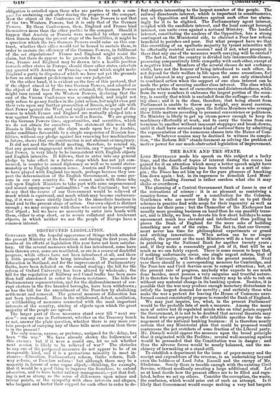OBSTRUCTED LEGISLATION.
COMPARED with the hopeful appearance of things which attended the present Ministry at its formation and during its first year, the results of its efforts at legislation this year have not been satisfac- tory. Of the several measures which it has introduced, some have been thrown over, some are mutilated, or are in a course of doubtful progress, while others have not been introduced at all, and there is tittle prospect of their being introduced. The measures for Education in Scotland, and for the improvement of Parliamentary Oaths, have been defeated on the second reading ; the bill for the reform of Oxford University has been altered by wholesale ; the bill for the regulation of Railway and Canal traffic has been more than half abandoned in order to disarm resistance. The bills for Parliamentary representation, and for the disfranchisement of cor- rupt electors in the five branded boroughs, have been withdrawn ; so has the bill for the amendment of the Poor-law by abolishing settlement and removal. The general measure of Education has not been introduced. Here is the withdrawal, defeat, mutilation, or withholding of measures connected with the most important interests of the country, aiming at objects upon which the great majority of the people are agreed.
The larger part of these measures stand over till "next ses- sion": can any one in Parliament, whether on the Treasury bench or not, answer the plain question, whether there is any more cer- tain prospect of carrying any of those bills next session than there is in the present?
The only reason, excuse, or pretence, assigned for tho delay, has been "the war." We have already shown the hollowness of this excuse ; but if it were a sound one, let us ask whether next session is likely to be relieved of war ? The obstacles to any one of the postponed measures do not appear to be of an insuperable kind, and it is a pretentious minority in most in- stances—Education, Parliamentary reform, Oaths reform, Rail- way reform, or Poor-law reform : but although there may be a majority in favour of some vague object,—thinking, for example, that it would be a good thing to improve the franchise, to extend education, and to have better railway management,—yet that feel- ing is not so strong as the sense of differences upon minor and trivial points, or the sympathy with class interests and cliques, who bargain and barter their support for each other in order to de- feat objects interesting to the largest number of the people. The railway directorate interest, which is important in constituencies, can set Opposition and Ministers against each other too alarm- ingly for it to be slighted. The Parliamentary agent interest, coupled with the candidate interest, and the local corrupt borough interest, can unite even against a national Ministry. The landed interest, constituting the nucleus of the Opposition, has a strong contingent on the Ministerial side, to obstruct a Poor-law reform beneficial to parishes and poor. But what prospect have we that this overriding of an apathetic majority, by tyrant minorities will be effectually resisted next session ? and if not, what prospect is there that any one of the measures worth carrying will be carried ?
The fact is, that the country is divided into innumerable classes, possessing comparatively little sympathy with each other, except of a negative kind. Members of de several classes do not exchange visits, have not the honour of being introduced to each other, do not depend for their welfare in life upon the same avocations, feel a faint interest in any general measure, and are only stimulated to combined action when the support of one class interest can be made the price of securing another class interest. The class which perhaps retains the most of earnestness and disinterestedness, while from its very numbers it embraces the largest portion of the coun- try, is exactly that which is excluded from the suffrage—the work- ing class ; and it is the class, therefore, that being absent from Parliament is unable to throw any weight, any moral coercion, any pressure from without, upon the listless Members who arrange these little matters according to personal convenience or politeness. No Ministry is likely to get up steam-power enough to keep its machinery effectually at work, and to carry the trains from one terminus to another without incessant stoppages and break-downs, until it shall have secured some kind of national force by admitting the representation of the numerous classes into the House of Com- mons. Whatever session may be destined to witness its comple- tion, "the Reform Bill" stands foremost as solving the problem of motive power for our much-obstructed legislation of improvement.


























 Previous page
Previous page